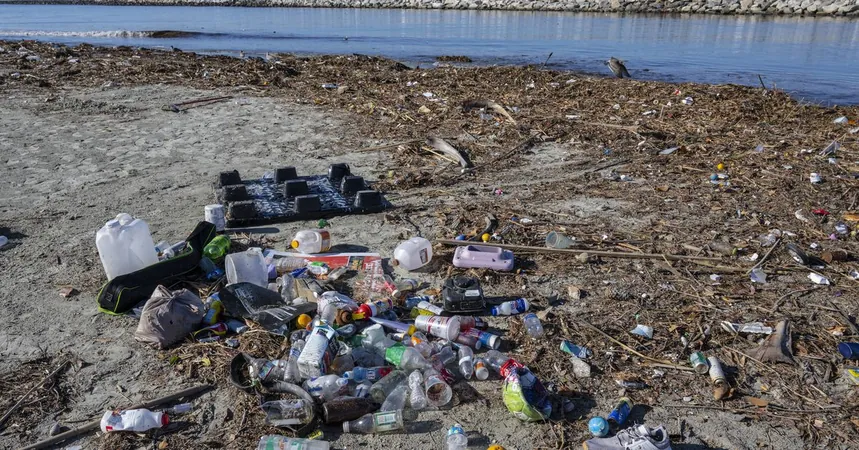
Lawsuit Alleges ExxonMobil Misled Public about Plastic Recycling for Decades
2024-09-23
Introduction
In a striking revelation, a recently filed lawsuit by the state of California accuses ExxonMobil of deceiving consumers for nearly fifty years regarding plastic recycling. The California Attorney General's office claims that ExxonMobil, as the world's leading producer of single-use plastics, has perpetuated a 'myth' that recycling could effectively address the escalating plastic waste crisis.
Accusations Against ExxonMobil
California Attorney General Rob Bonta stated that ExxonMobil knowingly misled the public into believing that recycling was a viable solution to the pervasive plastic waste problem. This lack of transparency, he argues, has significantly contributed to the crisis affecting not just the environment but also human health and wildlife.
The Complexity of Plastic Recycling
Plastic recycling is notoriously complex, and only a small fraction of plastic waste is ever successfully repurposed. Experts warn that promoting recycling can paradoxically lead to increased pollution, as it may encourage the continued production of single-use plastics and result in more discarded waste. The state of California is taking a firm stance to hold the plastic industry accountable, seeking to reverse the tide of plastic pollution that has infiltrated ecosystems and human bodies alike.
Investigation and Legal Action
The lawsuit stems from an investigation into the petrochemical industry's role in the plastic pollution crisis, which was launched in 2022. Over the last two years, new evidence uncovered by the Attorney General's office has fueled the state's legal action against ExxonMobil, alleging violations of public nuisance, natural resource, and water pollution laws, along with false advertising and unfair competition practices.
California's Demands
California is demanding civil penalties and the return of profits made through deceptive marketing practices. Furthermore, the state aims to establish an abatement fund and seek injunctive relief to prevent ExxonMobil from continuing its long-standing promotion of plastics as recyclable. An advertisement from 1989 published in Time magazine, which emphasized the urgent need to recycle, has been highlighted as an example of this alleged campaign of misinformation.
The Recycling Challenge
Despite the long history of recycling efforts, by 2015, less than 10% of plastic waste had ever been effectively recycled, with nearly 80% of the 6,300 million metric tons of plastic waste created worldwide ending up in landfills or polluting the environment. The recycling of plastic commonly leads to 'downcycling,' where the material's quality diminishes, meaning that recycled plastics are typically transformed into lower-grade products rather than new plastic items. This process often makes it less economical for companies to use recycled materials compared to virgin plastics.
ExxonMobil's Response
ExxonMobil responded to the lawsuit by shifting responsibility onto California officials, asserting that the state's recycling system has long been ineffective, and suggesting that collaboration, rather than litigation, would be a more constructive path forward.
Microplastics and Environmental Impact
Microplastics, which result from larger plastic products breaking down in the environment, have become ubiquitous, permeating oceans and entering food chains. Since 1985, approximately 21 million pounds of plastic waste have been collected from California’s beaches and waterways, underlining the scale of the pollution challenge California faces.
The Role of Plastics in Climate Change
The production of plastics, heavily reliant on fossil fuels, is responsible for approximately 4.5% of global greenhouse gas emissions—more than all greenhouse gases produced by the global shipping industry combined. With increasing attention on climate change, experts argue that the fossil fuel industry's role in exacerbating this crisis must be acknowledged and addressed.
Conclusion and Future Implications
In light of this lawsuit, environmental advocates are pushing for more stringent regulations on plastic production and better accountability from petrochemical companies like ExxonMobil. The implications of this legal battle could set significant precedents in the fight against plastic pollution and could reshape how corporations communicate about recycling and sustainability efforts in the future. Will this legal action ignite a movement towards responsibility and transparency in the petrochemical industry? Stay tuned as this story develops!



 Brasil (PT)
Brasil (PT)
 Canada (EN)
Canada (EN)
 Chile (ES)
Chile (ES)
 España (ES)
España (ES)
 France (FR)
France (FR)
 Hong Kong (EN)
Hong Kong (EN)
 Italia (IT)
Italia (IT)
 日本 (JA)
日本 (JA)
 Magyarország (HU)
Magyarország (HU)
 Norge (NO)
Norge (NO)
 Polska (PL)
Polska (PL)
 Schweiz (DE)
Schweiz (DE)
 Singapore (EN)
Singapore (EN)
 Sverige (SV)
Sverige (SV)
 Suomi (FI)
Suomi (FI)
 Türkiye (TR)
Türkiye (TR)